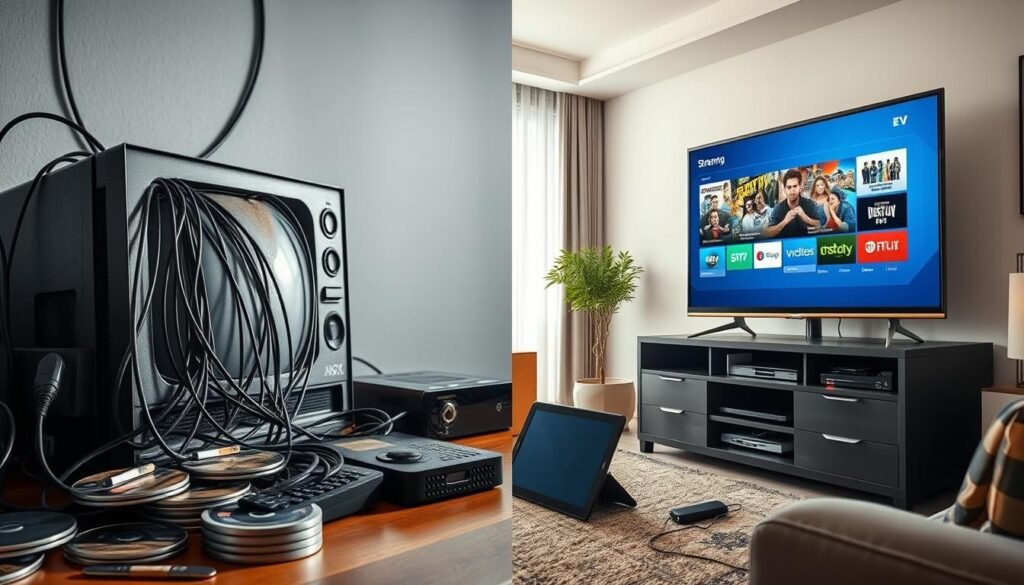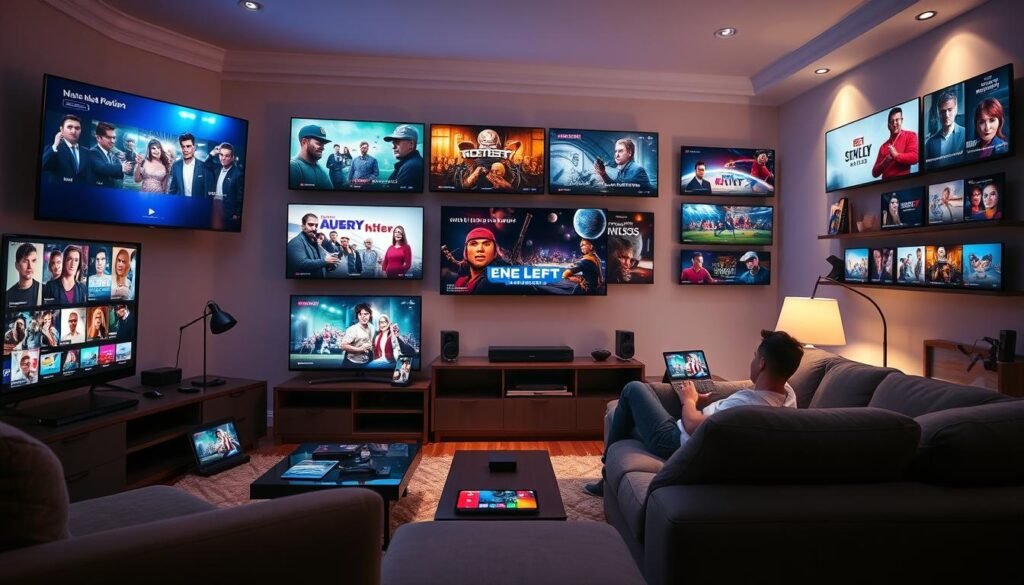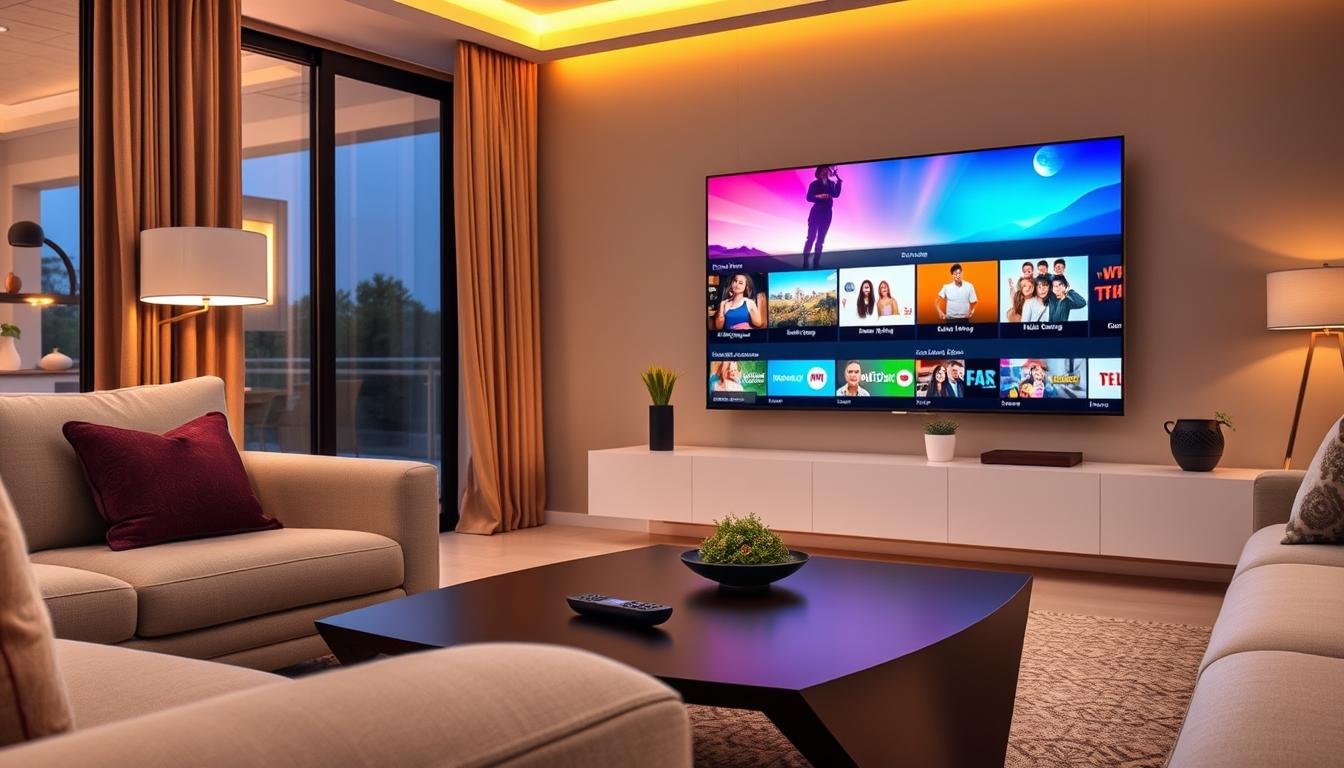In the world of TV, a big change is happening. More British homes are ditching cable TV for IPTV and streaming services. This move, called “cord-cutting,” is becoming more popular. It’s because people want more flexibility, to save money, and enjoy shows whenever they want.
IPTV, or Internet Protocol Television, is leading this change. It brings TV content over the internet, offering features cable TV can’t. With IPTV, you get lots of on-demand shows and easy access to streaming services. It’s changing how we watch TV in the digital age.
Key Takeaways
- Cord-cutting, the trend of abandoning traditional cable TV, is on the rise in the UK.
- IPTV, or Internet Protocol Television, is a modern alternative that delivers TV content over the internet.
- IPTV offers greater content flexibility, cost savings, and on-demand viewing options compared to cable TV.
- Streaming services are being increasingly integrated with IPTV platforms, providing a seamless entertainment experience.
- The changing viewing habits of British households, along with the high costs of traditional broadcasting, are driving the shift towards IPTV.
Understanding IPTV: A Modern Television Revolution
IPTV, or Internet Protocol Television, is changing how we watch TV. It uses the internet to send TV shows directly to our devices. This means we can watch what we want, when we want.
How IPTV Technology Works
IPTV sends digital video over the internet. It doesn’t need old cable or satellite systems. Instead, it uses the internet to send high-quality video to devices like smart TVs and phones.
Key Features and Benefits of IPTV Systems
IPTV systems have many great features. They let us watch TV on our own schedule. We can also get recommendations and control what our kids watch.
- On-Demand Viewing: IPTV lets us watch our favourite shows and movies whenever we want.
- Personalisation: IPTV systems can suggest shows based on what we like. They also let us set up special viewing profiles.
- Multiscreen Accessibility: IPTV works on many devices. This means we can watch TV on our TVs, laptops, phones, and tablets.
- Enhanced User Experience: IPTV has easy-to-use interfaces and features like pause and rewind. These make watching TV better.
As IPTV Technology, Over-the-Top Media, and Subscription Video on Demand grow, they’re changing TV watching. They give us more control and flexibility over what we watch.
The Rise of Cord-Cutting: Analysis of a Growing Trend
In the UK, a big change is happening in how we watch media. More people are choosing to cut the cord and switch to streaming services over traditional TV. This change is big for the media world.
More and more people, known as Cord-Nevers, are never signing up for cable or satellite TV. This change is because streaming services are getting better and cheaper. They offer a more personal and flexible way to watch what you want, when you want.
| Metric | 2020 | 2021 | 2022 |
|---|---|---|---|
| Cord-Cutting Rate | 15% | 18% | 22% |
| Cord-Nevers | 28% | 32% | 35% |
The rise of Cord-Cutting is making big waves for traditional TV. Broadcasters are finding it hard to keep up with what viewers want. With more people choosing IPTV and streaming, TV’s old way of making money is in trouble.
“The shift towards on-demand and personalised viewing has fundamentally altered the way we consume media. Cord-cutting is not just a passing trend, but a reflection of the evolving needs and preferences of modern viewers.”
This change is not just for TV. It’s affecting the whole media world. As we move through this change, TV companies need to find new ways to stay in the game.
Traditional Cable TV vs. IPTV: Cost Comparison
The cable TV market is facing tough competition from Cable TV Alternatives. Many British homes are now looking at different TV options. Traditional cable is no longer the only choice, thanks to Subscription Video on Demand and IPTV.
Hidden Fees in Cable Subscriptions
IPTV is known for clear pricing, unlike traditional cable TV. Cable TV often has hidden fees and unexpected costs. This can make budgeting for entertainment very hard.
IPTV Pricing Models and Value Proposition
IPTV offers clear and simple pricing. You can pick a plan that fits your viewing and budget. There’s no risk of hidden fees. Plus, IPTV has a huge library of on-demand content, adding to its value.
| Feature | Traditional Cable TV | IPTV |
|---|---|---|
| Pricing Transparency | Often hidden fees and surprise charges | Straightforward, predictable pricing |
| On-Demand Content | Limited selection, additional fees | Extensive library, often included in subscription |
| Flexibility | Rigid, long-term contracts | Flexible, short-term or no-contract options |
The comparison shows why IPTV is gaining popularity. It offers clear pricing, lots of on-demand content, and more flexibility. IPTV is becoming a top choice for those wanting a better TV deal in the UK.

Streaming Services Integration with IPTV Platforms
In today’s fast-changing TV world, Streaming Services and Over-the-Top Media have changed the game. IPTV platforms now bring together many popular streaming services. This creates a vast, Personalised Content world for viewers.
IPTV stands out by gathering a wide range of content. It meets the varied tastes of today’s viewers. Big names like Netflix, Amazon Prime Video, Disney+, and BBC iPlayer are now part of IPTV. This means users can access a huge library of movies, TV shows, and documentaries easily.
Combining Streaming Services with IPTV offers unmatched convenience and Personalised Content. Users can easily move between live TV, on-demand content, and their favourite Streaming Services. This creates a deep, engaging entertainment experience.
Also, the blend of Streaming Services with IPTV brings advanced features. These include tailored recommendations, smooth playback, and the ability to pick up where you left off on any device. This mix of old TV and new Over-the-Top Media has changed how British homes watch their favourite shows.
The need for flexible, Personalised Content keeps growing. The merge of Streaming Services with IPTV is key in the cord-cutting trend. IPTV providers are well-positioned to attract a tech-savvy, discerning audience in the UK with their all-in-one entertainment solution.
Why British Households Are Abandoning Traditional TV
British homes are moving away from traditional TV. This change comes from new viewing habits and high TV costs. It’s a big change for the media world.
Changing Viewing Habits in the UK
On-demand and mobile viewing have changed how people watch media in the UK. Young people love streaming services for their ease and flexibility. This has made traditional TV less popular, especially among the young.
Impact of High Broadcasting Costs
The high price of broadcast television subscriptions and the BBC licence fee are big factors. As money gets tighter, many choose cheaper IPTV and streaming options. These offer more content for less money.
| Traditional TV Subscription | IPTV Subscription |
|---|---|
| £50-£100 per month | £20-£40 per month |
| Limited on-demand content | Extensive on-demand library |
| Rigid programming schedules | Flexible viewing options |
High TV costs and new viewing habits have led many to switch to IPTV. It’s cheaper and more flexible than traditional TV.
Content Flexibility and On-Demand Options
In today’s world of binge-watching and custom content, IPTV has changed how we watch TV. No more fixed schedules or limited choices. IPTV gives us flexibility that old TV services can’t.
One big plus of IPTV is customising your content packages. You can pick what you want to watch, from shows to movies and live events. This makes watching TV better and saves money by cutting out unwanted channels.
IPTV also lets you watch shows whenever you want. No more missing out or being stuck to TV schedules. You can pause, rewind, and start again whenever you like. This makes watching TV more personal and flexible.
“IPTV has completely transformed the way I watch TV. The flexibility to access my favourite shows whenever I want, and the ability to customise my package to suit my interests, has been a game-changer.”
As more people want on-demand and custom content, IPTV is ready to meet their needs. It offers a mix of live TV and subscription video on demand. This makes it the top choice for a tailored and easy TV experience.

Technical Requirements for IPTV Implementation
IPTV technology is becoming more popular in British homes. It’s important to know what you need to set it up. This includes fast internet and the right devices. With the right help, switching to IPTV can be easy.
Internet Speed Requirements
Good internet speed is key for IPTV. You’ll need at least 15 Mbps for a smooth experience. For HD content or multiple devices, 25 Mbps or more is better.
Compatible Devices and Setup Process
IPTV works with many devices like smart TVs and streaming boxes. Setting it up involves connecting to your network and activating it. Most providers offer easy guides and support to help you.
| IPTV Technology | Over-the-Top Media |
|---|---|
| IPTV (Internet Protocol Television) is a technology that delivers television content over the internet, allowing users to access a wide range of channels, on-demand content, and advanced features. | Over-the-Top (OTT) media refers to the delivery of content directly to viewers over the internet, bypassing traditional cable or satellite TV providers. OTT platforms, such as streaming services, are often integrated with IPTV systems to offer a comprehensive entertainment experience. |
Knowing what you need for IPTV helps British homes make a smart choice. With the right internet and devices, IPTV brings flexibility and endless entertainment.
The Future of Television Broadcasting in Britain
The way we watch TV in Britain is changing fast. More people are cutting the cord and using IPTV (Internet Protocol Television). This big change is moving us away from the old TV watching ways.
Broadcast Television Disruption is clear, as viewers ditch traditional TV for new, on-demand services. IPTV is leading the way with its ease, flexibility, and value. It lets viewers pick what they want to watch, when they want to watch it.
The future of TV in Britain will likely see more streaming services on IPTV. This will make watching TV even better. Also, 5G technology will help make internet speeds faster and connections more reliable. This will make watching TV online even smoother.
Old TV companies will have to change to stay in the game. They might start their own IPTV services or improve their online content. They’ll also need to find new ways to make money to keep going.
“The future of television is not just about the content, but about the way it is delivered and consumed. IPTV is at the forefront of this transformation, empowering viewers to take control of their entertainment experiences.”
The TV industry in Britain is facing big changes. These changes will keep shaping TV broadcasting. They will bring both challenges and chances for everyone involved.
Legal Considerations and Service Reliability
The popularity of IPTV technology is growing fast. It’s key to think about the legal side and how reliable these services are. In the UK, IPTV must follow strict rules to protect both creators and viewers.
UK Broadcasting Regulations
In the UK, IPTV services must follow Ofcom’s rules. Ofcom is in charge of broadcasting, telecoms, and postal services. They make sure IPTV providers are licensed, follow content standards, and protect consumers. Breaking these rules can lead to big fines and even service shutdown.
Service Quality Assurance
For IPTV Technology and Streaming Services users, a reliable service is vital. IPTV needs a strong internet connection, unlike traditional TV. Providers must ensure their services can stream high-quality videos without interruptions.
“The future of television lies in the hands of IPTV, but only if it can deliver the reliability and quality that consumers expect.”
As IPTV grows, so does the importance of content licensing and copyright. By tackling these issues, IPTV can become a strong choice against traditional TV. It gives viewers more control and flexibility over what they watch.
Making the Switch: Practical Steps and Considerations
More and more British homes are ditching traditional cable TV for IPTV (Internet Protocol Television). This guide will help you make a smooth transition. It covers everything you need to know about switching to cable TV alternatives.
Assess Your Internet Capabilities
Your internet speed is key for a good IPTV experience. Check your current speed and bandwidth. Make sure it can handle IPTV streaming. Talk to your internet provider to find the best plan for your needs.
Research IPTV Providers
Look into different IPTV providers in the UK. Compare their services, prices, and what other customers say. Think about the channels, on-demand content, and how easy it is to use. Choose one that fits your viewing habits.
Choose the Right IPTV Equipment
Picking the right IPTV device is important. You can use smart TVs, streaming boxes, or dedicated IPTV boxes. Make sure they work well with your network and internet.
Migrate Your Content and Subscriptions
Write down your current cable TV and on-demand services. Look for IPTV platforms that work with popular streaming services. This way, you can keep your favourite shows and movies.
Test and Troubleshoot
Try out your IPTV setup before you fully switch. Check that all devices are connected and the internet is stable. Make sure the IPTV service works well. Be ready to fix any problems that come up.
By taking these steps, British homes can easily switch to IPTV. This opens up a world of Cord-Cutting and Cable TV Alternatives options.
Conclusion
The rise of cord-cutting and IPTV in the UK is clear. People love the flexibility and variety IPTV offers. They’re moving away from traditional cable TV.
Streaming services have changed how we watch TV in the UK. Now, we can watch what we want, when we want. This makes IPTV a popular choice for many.
The future of TV in Britain looks bright for IPTV. As technology gets better and internet speeds increase, more will switch from cable TV. The UK is on the brink of a new TV era.

